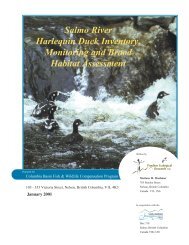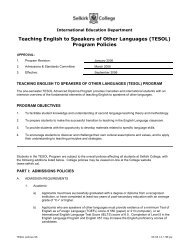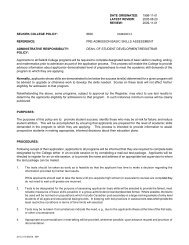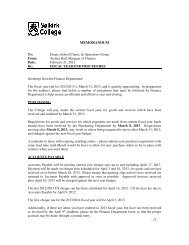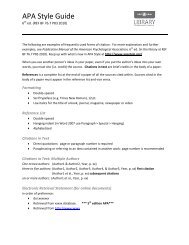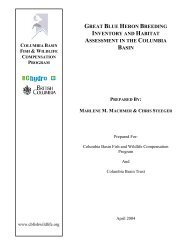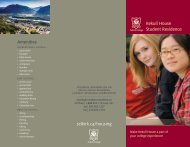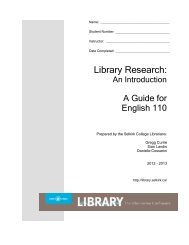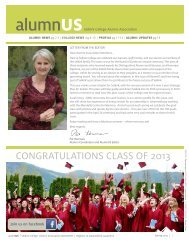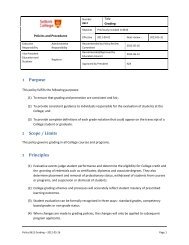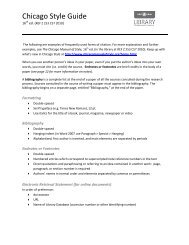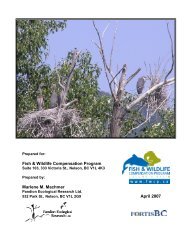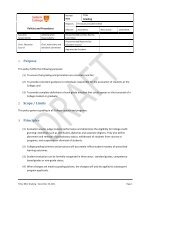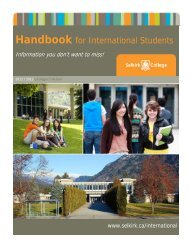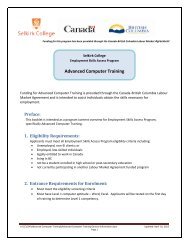selk irk.ca - Selkirk College
selk irk.ca - Selkirk College
selk irk.ca - Selkirk College
Create successful ePaper yourself
Turn your PDF publications into a flip-book with our unique Google optimized e-Paper software.
Classroom and community support worker<br />
Program Courses<br />
CCSW 155 Foundations of Practice<br />
This course introduces students to the theory and<br />
philosophi<strong>ca</strong>l perspectives necessary for working<br />
with individuals who are challenged by a disabling<br />
condition. Values regarding service delivery are<br />
explored through an histori<strong>ca</strong>l review of the<br />
disability movement and an examination of new<br />
initiatives and trends. This course also explores the<br />
impact of specific challenging conditions on the<br />
individual, the family and the service providersí<br />
practice. Through personal reflection and research,<br />
the roots of person centred support will be explored<br />
and students will develop their own personal and<br />
professional philosophy of support work.<br />
CCSW 156 Support Strategies<br />
This course focuses on support strategies used with<br />
individuals who have disabilities. The analysis<br />
and understanding of behaviour as a means of<br />
communi<strong>ca</strong>tion is explored. Strategies are learned<br />
and practised in context to support individuals<br />
with the development of pro-social skills, life,<br />
vo<strong>ca</strong>tional, and a<strong>ca</strong>demic skills. An awareness of<br />
issues related to healthy sexuality and the ethics<br />
of touch are explored. Emphasis is placed on the<br />
ethics of support work and effective implementation<br />
of strategies to support individuals with<br />
disabilities to be as independent as possible.<br />
CCSW 170 Augmentative<br />
Communi<strong>ca</strong>tion<br />
This course explores alternative forms of communi<strong>ca</strong>tion<br />
for people with little or no speech.<br />
Non-speech communi<strong>ca</strong>tion programming is<br />
examined through review of normal and disordered<br />
language and the strengths and weaknesses<br />
of various augmentative communi<strong>ca</strong>tion systems.<br />
Communi<strong>ca</strong>tion systems studied include sign<br />
language and other manual systems, pictogram/<br />
ideogram communi<strong>ca</strong>tion and electronic systems.<br />
ENGL 110 <strong>College</strong> Composition<br />
Students needing a year of Introductory English<br />
may choose to take English 110/111 or English<br />
112/114. English 112/114 focuses on reading and<br />
interpretation of literature, and is an attractive alternative<br />
to English 110/111 for students wishing<br />
to continue in the study of Arts or Humanities.<br />
English 110: <strong>College</strong> Composition is designed<br />
to enable the student to produce clear, coherent<br />
and fully developed essays. The course covers<br />
a<strong>ca</strong>demic writing styles, rhetori<strong>ca</strong>l modes, editing<br />
techniques and research practices.<br />
Prerequisites<br />
A ‘C’ or better in ENGL 12 or equivalent or LPI<br />
level 4.<br />
This course is available via Distance Edu<strong>ca</strong>tion.<br />
HSER 174 Interpersonal<br />
Communi<strong>ca</strong>tions<br />
Provides the student with an opportunity to<br />
examine personal goals, values and attitudes;<br />
develop and practice listening and responding<br />
skills, and become more aware of personal<br />
strengths and limitations. Designed to help gain<br />
self-understanding in order to be more effective in<br />
working with people.<br />
PSYC 100 Introductory Psychology I<br />
An introduction to the methods, theory and<br />
practice of psychology as a science. Among others,<br />
topics will include motivation and emotion,<br />
learning and memory, biologi<strong>ca</strong>l foundations,<br />
sensation and perception. Other topics are added<br />
at the discretion of the individual instructor. Class<br />
demonstrations and activities are used to illustrate<br />
concepts. Teaching methods and resources in the<br />
course vary with the instructor.<br />
Prerequisites<br />
ENGL 12 or equivalent with a grade of “C” or<br />
better or written permission of the Instructor and<br />
School Chair.<br />
This course is available via Distance Edu<strong>ca</strong>tion.<br />
FAM 180 Family Dynamics<br />
This course is designed to provide students with a<br />
variety of theoreti<strong>ca</strong>l perspectives to understanding<br />
families. It considers the diversity of families<br />
including exploration of cultural differences,<br />
same-sex parents, single parents and blended<br />
families. The role of marriage is examined, as well<br />
as childbearing and socialization. Issues such as<br />
middle age, empty nest, aging in the family, and<br />
special concerns such as chronic illness, disability,<br />
alcoholism, violence, and poverty are introduced.<br />
Prerequisites<br />
ENGL 12 or equivalent.<br />
CCSW 160 Classroom<br />
Support Strategies<br />
This course focuses on integration of children into<br />
inclusive school situations with an emphasis on<br />
guidance approaches, teaching strategies, curriculum<br />
adaptation and the interrelationship of assessment<br />
and curriculum. Child development principles<br />
provide the basis for program planning and implementation.<br />
The importance of cultural diversity and<br />
the role of the edu<strong>ca</strong>tional assistant are stressed.<br />
Please Note: This course is under revision, see<br />
the on-line <strong>ca</strong>lendar for updates.<br />
CCSW 161 Person-Centered Planning<br />
This course focuses on the need for planning,<br />
advantages and disadvantages of planning and<br />
the key elements of the planning process. The<br />
course examines how to identify and obtain<br />
information relevant to planning, formulation of<br />
long and short-Semester objectives, prioritization<br />
of objectives, and translation of objectives into<br />
action. Emphasis is placed on viewing planning<br />
as a dynamic process and analysis of human<br />
interaction as part of the planning process. Models<br />
for structuring positive interaction of all planning<br />
team members are reviewed.<br />
CCSW 165 Health and Wellness<br />
This course is designed to introduce the<br />
essential concepts of health and wellness with<br />
emphasis on six dimensions of wellness including:<br />
emotional, intellectual, spiritual, occupational,<br />
social and physi<strong>ca</strong>l. Students will examine health<br />
and wellness from two perspectives: from the<br />
perspective of the students’ lives and also the lives<br />
of individuals with disabilities. The course will<br />
emphasize the importance of lifestyle changes<br />
being self-directed and on understanding ways<br />
in which we <strong>ca</strong>n support change in others and<br />
ourselves. Topics include: stress management, diet<br />
and nutrition, aging, intimacy and relationships,<br />
immunity, safety, lifestyle, developing relationships<br />
and quality of life.<br />
CCSW 179 Appli<strong>ca</strong>tion of<br />
Theory to Practice<br />
CCSW 195 Practicum I<br />
This course provides students with an opportunity<br />
to work and observe in an edu<strong>ca</strong>tional or<br />
community living setting under the direction of<br />
college instructors and on-site staff. The focus<br />
of this practicum is to provide students with<br />
an opportunity to interact with children or<br />
adults with challenging conditions, to develop<br />
objective documentation skills and to observe the<br />
techniques and procedures used by on-site staff.<br />
This is a 17-day practicum beginning with two<br />
preparation days. A seminar, CCSW 179, will<br />
allow students time for integration of their work<br />
experience and peer support.<br />
PSYC 101 Introductory Psychology II<br />
Topics include thinking and other cognitive processes,<br />
development of the individual, personality,<br />
behaviour disorders, health and social psychology.<br />
Other topics are added at the discretion of the<br />
instructor. Class demonstrations and activities are<br />
used to illustrate concepts.<br />
Prerequisites<br />
PSYC 100 with a grade of “C” or better or written<br />
permission of the Instructor and School Chair.<br />
This course is available via Distance Edu<strong>ca</strong>tion.<br />
SSW 161 Introduction<br />
to Social Policy<br />
Social issues confront us every day in our dealings<br />
with people and governments. This course will<br />
examine some of the issues and how they have<br />
School of Health and Human Services<br />
Selk<strong>irk</strong> <strong>College</strong> 12/13<br />
111



